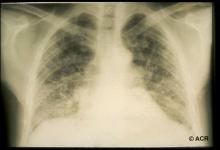Canakinumab Patients have Lower Risk of Lung Cancer Save

The CANTOS trial has shown that interleukin 1β inhibition by Canakinumab (CAN) resulted not only in a reduction of cardiovascular deaths but also significantly decreased the incidence and death from lung cancer.
This randomised, double-blind, placebo-controlled trial enrolled 10,061 patients with atherosclerosis and a prior myocardial infarction, but no history of cancer. Patients had to have an elevated high-sensitivity C-reactive protein (hsCRP) of 2 mg/L or greater and were randomized to either placebo (PBO) or 3 different doses of canakinumab (50 mg, 150 mg, 300 mg) given subcutaneously every 3 months.
Enrollment hsCRP (median 6·0 mg/L vs 4·2 mg/L; p0·0001) and interleukin 6 (3·2 vs 2·6 ng/L; p0·0001) were significantly higher in those subsequently diagnosed with lung cancer. With a median follow-up of 3·7 years, CAN showed a dose-dependent reduction in hsCRP (26–41%) and IL-6 (25–43%).
Total cancer mortality was significantly lower in the pooled CAN patients versus the PBO group (p=0·0007).
Compared to PBO, incident lung cancer was significantly less frequent in the CAN 150 mg and 300 mg patients (HR 0·61, HR 0·33, respectively. Lung cancer mortality was significantly less common in the CAN 300 mg group than in the placebo group (HR 0·23; p=0·0002).
In contrast, fatal infections or sepsis were significantly more common with CAN vs. PBO.
Mechanisms underlying the role of interleukin-1β and the innate immunity pathway in incident lung cancer and lung cancer mortality require furether investigation.







If you are a health practitioner, you may Login/Register to comment.
Due to the nature of these comment forums, only health practitioners are allowed to comment at this time.